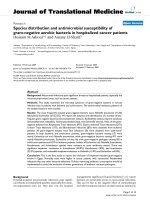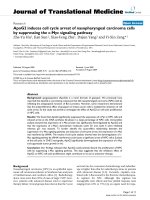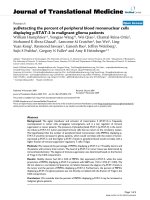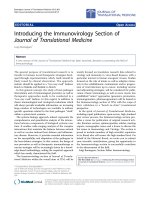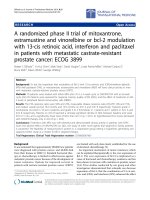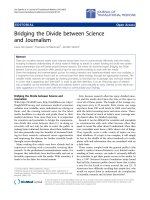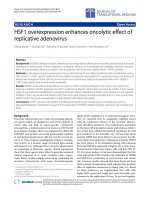Báo cáo hóa học: " Introducing the Cancer Microenvironment Section of Journal of Translational Medicine" pot
Bạn đang xem bản rút gọn của tài liệu. Xem và tải ngay bản đầy đủ của tài liệu tại đây (230.64 KB, 2 trang )
Vidal-Vanaclocha and Witz Journal of Translational Medicine 2010, 8:60
/>Open Access
COMMENTARY
© 2010 Vidal-Vanaclocha and Witz; licensee BioMed Central Ltd. This is an Open Access article distributed under the terms of the Cre-
ative Commons Attribution License ( which permits unrestricted use, distribution, and re-
production in any medium, provided the original work is properly cited.
Commentary
Introducing the Cancer Microenvironment Section
of Journal of Translational Medicine
Fernando Vidal-Vanaclocha*
1
and Isaac P Witz
2
Editorial
BioMed Central is proud and delighted to announce the
new section of the Journal of Translational Medicine
devoted to promoting the field of Cancer Microenviron-
ment.
A new forum on diagnostic and therapeutic implications of
molecular biomarkers and targets from the cancer
microenvironment
The "Seed and Soil" theory, proposed by Stephen Paget
over 120 years ago (1889) [1], laid the foundations for the
modern concept of the tumor microenvironment (TME)
and its involvement in organ-specific metastasis. In con-
temporary clinical oncology TME research is focused on
the elucidation of tumor-microenvironment interac-
tions, at different clinical phases, that contribute to can-
cer progression and metastasis. The understanding of the
constellation of cancer cells with various factors in the
microenvironment is an essential prerequisite for rational
therapeutically targeting of metastasis-promoting tumor-
microenvironment interactions (for review, see Witz,
2008) [2].
The field of TME research is propagating steadily.
Recent discoveries in this area include: mechanisms of
cancer cell regulation at metastatic niches; identification
of functional links between biologic background at spe-
cific organs and incidence and progression of cancer and
metastasis; delineating tumorigenic and pro-metastatic
effects of infectious agents, insight into the effects of
inflammatory factors, hypoxia and oxidative stress on
cancer progression; findings related to the origin and
unique features of cancer-associated fibroblasts, mac-
rophages and bone marrow-derived cells; tissue architec-
ture and extracellular matrix associated to tumor
stromagenesis and angiogenesis; cancer cell dormancy;
and community effects among heterogeneous cancer cell
subpopulations, including cancer stem cells.
Translational cancer research is a well consolidated
activity at the academic, industrial and governmental lev-
els. In contrast, there is a lot to be done with respect to
translating the insights gained in the laboratory on the
involvement of the TME in cancer pathogenesis to the
clinic and the biomedical industry. Translational research
that bridges the laboratory and the clinic is still under
development, and this new section of the JTM is espe-
cially interested in the publication of discoveries in four
areas:
1) Clinical models that allow the characterization of the
molecular profile of non-cancer cells in the TME and of
their soluble products, and how these cells can be regu-
lated at different stages of cancer progression.
2) Molecular mechanisms that govern the establish-
ment of subclinical metastatic niches, and biomarkers
that characterize the cellular components of such niches.
Such studies might lead to novel approaches to detect,
prevent or cure metastasis.
3) Studies seeking to correlate defined cancer microen-
vironment biomarkers with incidence, response to and
outcome of therapy.
4) Laboratory studies of new drugs and biological
agents that can target the TME and exert beneficial influ-
ences on cancer patients.
The focus of this new section of the JTM is on studies
that bridge the laboratory and the clinic. We intend to
publish original articles describing experimental or clini-
cal data on the cellular and molecular components of the
TME with implications for prevention, diagnosis, and
therapy of human cancers.
There are boundless possibilities offered by a rapidly
published, open-access, online communication of results
and exchange of opinions. The Cancer Microenviron-
ment section of JTM is a potent tool to most efficiently
achieve these tasks. Thus, this section of the JTM pro-
vides a venue for publication of original research articles,
literature reviews, opinion/position papers, and a forum
* Correspondence:
1
Institute of Applied Molecular Medicine (IMMA) and University Hospital of
Madrid Scientific Foundation, CEU-San Pablo University School of Medicine,
Boadilla del Monte, 28668 Madrid, Spain
Full list of author information is available at the end of the article
Vidal-Vanaclocha and Witz Journal of Translational Medicine 2010, 8:60
/>Page 2 of 2
to discuss the hot issues in the cancer microenvironment.
Therefore, we have the honor and pleasure to invite you
to submit your work, your thoughts and/or to engage in
informal discussions. We welcome you and look forward
to your contributions.
Author Details
1
Institute of Applied Molecular Medicine (IMMA) and University Hospital of
Madrid Scientific Foundation, CEU-San Pablo University School of Medicine,
Boadilla del Monte, 28668 Madrid, Spain and
2
Department of Cell Research &
Immunology, Faculty of Life Sciences, Tel Aviv University, Ramat Aviv, Tel Aviv,
69978, Israel
References
1. Paget S: The distribution of secondary growths in cancer of the breast.
Lancet 1889, 133:571-73.
2. Witz IP: Tumor-microenvironment interactions: dangerous liaisons. Adv
Cancer Res 2008, 100:203-229.
doi: 10.1186/1479-5876-8-60
Cite this article as: Vidal-Vanaclocha and Witz, Introducing the Cancer
Microenvironment Section of Journal of Translational Medicine Journal of
Translational Medicine 2010, 8:60
Received: 18 June 2010 Accepted: 22 June 2010
Published: 22 June 2010
This article is available from: 2010 Vidal-Vanaclocha and Witz; licensee BioMed Central Ltd. This is an Open Access article distributed under the terms of the Creative Commons Attribution License ( ), which permits unrestricted use, distribution, and reproduction in any medium, provided the original work is properly cited.Journal of Translational Medicine 2010, 8:60


